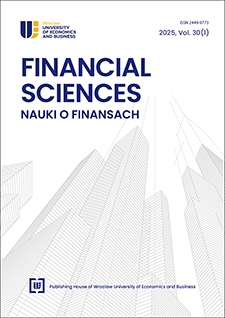Beyond Necessity: How Generation Z in Poland Engages with Informal Markets for Sustainable Consumption
DOI:
https://doi.org/10.15611/fins.2025.1.02Keywords:
informal economy, consumer behaviour, sustainability, equality, consumer resistanceAbstract
Aim: This study focused on the interdependence of the informal economy and sustainable consumer behaviour. By using cluster analysis, it challenges traditional views that categorise the informal economy as marginal and economically backward.
Methodology: A survey was used to collect the data from a group of respondents from Poland, representing generation Z (n = 115).
Results: The research results made it possible to distinguish between two groups: one that actively chooses informal markets based on values, such as concern for the environment, social equality and identification with the global community, and another one that leans towards more traditional market approaches. The paper highlights that participation in the informal market involves a value-based choice influenced by ethical, environmental and ideological considerations, among others.
Implications and recommendations: The findings offer valuable implications for policymakers and businesses, stressing the need for adaptive action that is in line with emerging consumer priorities and the changing role of the informal economy in sustainable development.
Originality/value: This study links economic behaviour with psychological constructs. Previous research in this area focused on informal market participation to a very limited extent, mainly among marginalised groups (e.g. low-income populations). In turn, consumers with other characteristics, such as greater concern for the environment and a perceived need for equality, also engage in the informal economy, suggesting that ethical and sustainability considerations may guide informal market choices.
Downloads
References
Adam, M. C., & Ginsburgh, V. (1985). The Effects of Irregular Markets on Macroeconomic Policy: Some Estimates for Belgium. European Economic Review, 29(1), 15-33.
Alwitt, L. F., & Donley, T. D. (1996). The Low-Income Consumer: Adjusting the Balance of Exchange. SAGE Publications.
Bauman, Z. (2009). The Absence of Society. In D. Utting (Eds.), Contemporary Social Evils (pp. 147-157). Policy Press.
Berman, B., & Dong, M. (2016). Gray Markets: Past, Present, and Future. The International Review of Retail, Distribution and Consumer Research, 26(1), 95-111.
Chen, M. A. (2007). Rethinking the Informal Economy: Linkages with the Formal Economy and the Formal Regulatory Environment. DESA Working Paper, 46.
Culiberg, B., & Bajde, D. (2014). Do You Need a Receipt? Exploring Consumer Participation in Consumption Tax Evasion as an Ethical Dilemma. Journal of Business Ethics, 124, 271-282.
Dabija, D. C., Bejan, B. M., & Dinu, V. (2019). How Sustainability Oriented is Generation Z in Retail? A Literature Review. Transformations in Business & Economics, 18(2), 150-155.
de Canio, F. (2023). Consumer Willingness to Pay More for Pro-Environmental Packages: The Moderating Role of Familiarity. Journal of Environmental Management, 339, 117828.
Dewalska-Opitek, A., & Witczak, O. (2023). Generation Z as Consumers–Contemporary Relationship Challenges. Zeszyty Naukowe Akademii Górnośląskiej, 4, 53-61.
Djankov, S., Glaeser, E., La Porta, R., Lopez-de-Silanes, F., & Schleifer, A. (2008). The New Comparative Economics. World Bank. Harvard University, mimeo (unpublished).
Dube, E. E. (2021). Motivations and Livelihood Dynamics in the Urban Informal Economy: The Case of Dire Dawa City, Eastern Ethiopia. Bulletin of Geography. Socio-economic Series, 51, 61-74.
Field, A. (2024). Discovering Statistics Using IBM SPSS Statistics. Sage Publications.
First Insight. (2020). The State of Consumer Spending: Gen Z Shoppers Demand Sustainable Retail. Retrieved November 14, 2024 from https://cwrrr.org/research-reports/the-state-of-consumer-spending-gen-z-shoppers-demand-sustainable-retail/
Fornell, C., & Larcker, D. F. (1981). Structural Equation Models with Unobservable Variables and Measurement Error: Algebra and Statistics. Journal of Marketing Research, 18(3), 382-388.
Hair Jr, J. F., Black, W. C., Babin, B. J., & Anderson, R. E. (2010). Multivariate Data Analysis. In Multivariate Data Analysis (pp. 785-785). Person.
Horodnic, I. A., Ciobanu, C. I., Zaiț, A., & Williams, C. C. (2022). Who Purchases from the Informal Economy and Why? Frontiers in Psychology, 13, 940076.
Horodnic, I. A., Williams, C. C., Windebank, J., Zaiț, A., & Ciobanu, C. I. (2021). Explaining Consumer Motives to Purchase in the Informal Economy. Plos one, 16(10), e0258686.
Igudia, E., Ackrill, R., Coleman, S., & Dobson, C. (2016). Determinants of the Informal Economy of an Emerging Economy: A Multiple Indicator, Multiple Causes Approach. International Journal of Entrepreneurship and Small Business, 28(2-3), 154-177.
La Porta, R., & Shleifer, A. (2014). Informality and Development. Journal of Economic Perspectives, 28(3), 109-126.
Littlewood, D., Rodgers, P., & Yang, J. (2018). “The Price is Different Depending on Whether You Want a Receipt or Not”: Examining the Purchasing of Goods and Services from the Informal Economy in South-East Europe. The Service Industries Journal, 38(11-12), 688-707.
London, T., Esper, H., Grogan‐Kaylor, A., & Kistruck, G. M. (2014). Connecting Poverty to Purchase in Informal Markets. Strategic Entrepreneurship Journal, 8(1), 37-55.
Lopes, J. M., Pinho, M., & Gomes, S. (2024). From Green Hype to Green Habits: Understanding the Factors That Influence Young Consumers’ Green Purchasing Decisions. Business Strategy and the Environment, 33(3), 2432-2444.
MacQueen, J. (1967). Some Methods for Classification and Analysis of Multivariate Observations. In Proceedings of the Fifth Berkeley Symposium on Mathematical Statistics and Probability, Volume 1: Statistics (pp. 281-298). University of California Press.
Marumo, O., & Mabuza, M. L. (2018). Determinants of Urban Consumers’ Participation in Informal Vegetable Markets: Evidence from Mahikeng, North West Province, South Africa, and Implications for Policy. South African Journal of Economic and Management Sciences, 21(1), 1-9.
McCrohan, K., Smith, J. D., & Adams, T. K. (1991). Consumer Purchases in Informal Markets: Estimates for the 1980s, Prospects for the 1990s. Journal of Retailing, 67(1), 22.
Orea-Giner, A. (2023). Generation Z Lifestyle. Food Activism and Sustainable Traveller Behaviour. In S. Seyfi, C. M. Hall, & M. Strzelecka (Eds.), Gen Z, Tourism, and Sustainable Consumption: The Most Sustainable Generation Ever? Routledge.
Ozanne, L. K., & Ballantine, P. W. (2010). Sharing as a Form of Anti‐Consumption? An Examination of Toy Library Users. Journal of Consumer Behaviour, 9(6), 485-498.
Perry, G. (Ed.) (2007). Informality: Exit and Exclusion. World Bank Publications.
Pratto, F., Sidanius, J., Stallworth, L. M., & Malle, B. F. (1994). Social Dominance Orientation: A Personality Variable Predicting Social and Political Attitudes. Journal of Personality and Social Psychology, 67(4), 741.
Punj, G., & Stewart, D. W. (1983). Cluster Analysis in Marketing Research: Review and Suggestions for Application. Journal of Marketing Research, 20(2), 134-148.
Rabinowitz, M. (2011). Rise of the Shadow Economy: Second Largest Economy in the World. Retrieved from: http://www.forbes.com/sites/benzingainsights/2011/11/07/rise-of-the-shadow-economy-second-largest-economy-in-the-world/#4c81c01d5d38
Reysen, S., & Katzarska-Miller, I. (2013). A Model of Global Citizenship: Antecedents and Outcomes. International Journal of Psychology, 48(5), 858-870.
Schneider, F. (1998). Further Empirical Results of the Size of the Shadow Economy of 17 OECD-Countries Over Time. 54th
Congress of the IIPF Cordowa, Argentina and Discussion Paper, Department of Economics, University of Linz, Linz, Austria.
Schneider, F. (2022). New COVID-Related Results for Estimating the Shadow Economy in the Global Economy in 2021 and 2022. International Economics and Economic Policy, 19(2), 299-313.
Schneider, F., Buehn, A., & Montenegro, C. E. (2011). Shadow Economies All Over the World: New Estimates for 162 Countries from 1999 to 2007. In Handbook on the Shadow Economy. Edward Elgar Publishing.
Schneider, F., & Enste, D. H. (2000). Shadow Economies: Size, Causes, and Consequences. Journal of Economic Literature, 38(1), 77-114.
Sharma, P. (2015). Consumer Ethnocentrism: Reconceptualization and Cross-Cultural Validation. Journal of International Business Studies, 46, 381-389.
Szul, E. (2012). Dekonsumpcja – moda czy sposób na kryzys. Nierówności Społeczne a Wzrost Gospodarczy, 24, 316-328.
Tulgan, B. (2013). Meet Generation Z: The Second Generation within the Giant “Millennial” Cohort. Rainmaker Thinking, 125(1), 1-13.
Tuma, M. N., Decker, R., & Scholz, S. W. (2011). A Survey of the Challenges and Pitfalls of Cluster Analysis Application in Market Segmentation. International Journal of Market Research, 53(3), 391-414.
Venkatesh, S. A. (2006). Off the Books: The Underground Economy of the Urban Poor. Harvard University Press.
Viswanathan, M., Sridharan, S., Ritchie, R., Venugopal, S., & Jung, K. (2012). Marketing Interactions in Subsistence Marketplaces: A Bottom-Up Approach to Designing Public Policy. Journal of Public Policy & Marketing, 31(2), 159-177.
Webb, J. W., Bruton, G. D., Tihanyi, L., & Ireland, R. D. (2013). Research on Entrepreneurship in the Informal Economy: Framing a Research Agenda. Journal of Business Venturing, 28(5), 598-614.
Williams, C. C. (2006). How Much for Cash? Tackling the Cash-in-Hand Ethos in the Household Services Sector. The Service Industries Journal, 26(5), 479-492.
Williams, C. C., & Bezeredi, S. (2017). Explaining Consumers’ Motives for Purchasing from the Informal Economy: Some Lessons from a Study of Bulgaria, Croatia and FYR of Macedonia. Economic Alternatives, 4, 515-531.
Williams, C. C., & Kosta, B. (2021). Why Do Consumers Buy from Informal Sector Suppliers in East-Central Europe? A Case Study of Home Repair and Renovation Services. Economic Alternatives, 1, 134-152.
Williams, C. C., & Martinez-Perez, A. (2014). Why Do Consumers Purchase Goods and Services in the Informal Economy? Journal of Business Research, 67(5), 802-806.
Williams, C. C., & Windebank, J. (2000). Modes of Goods Acquisition in Deprived Neighbourhoods. The International Review of Retail, Distribution and Consumer Research, 10(1), 73-94.
Downloads
Published
Issue
Section
License
Copyright (c) 2025 Agnieszka Małecka, Gregor Pfajfar

This work is licensed under a Creative Commons Attribution-ShareAlike 4.0 International License.
Accepted 2025-03-31
Published 2025-07-01









